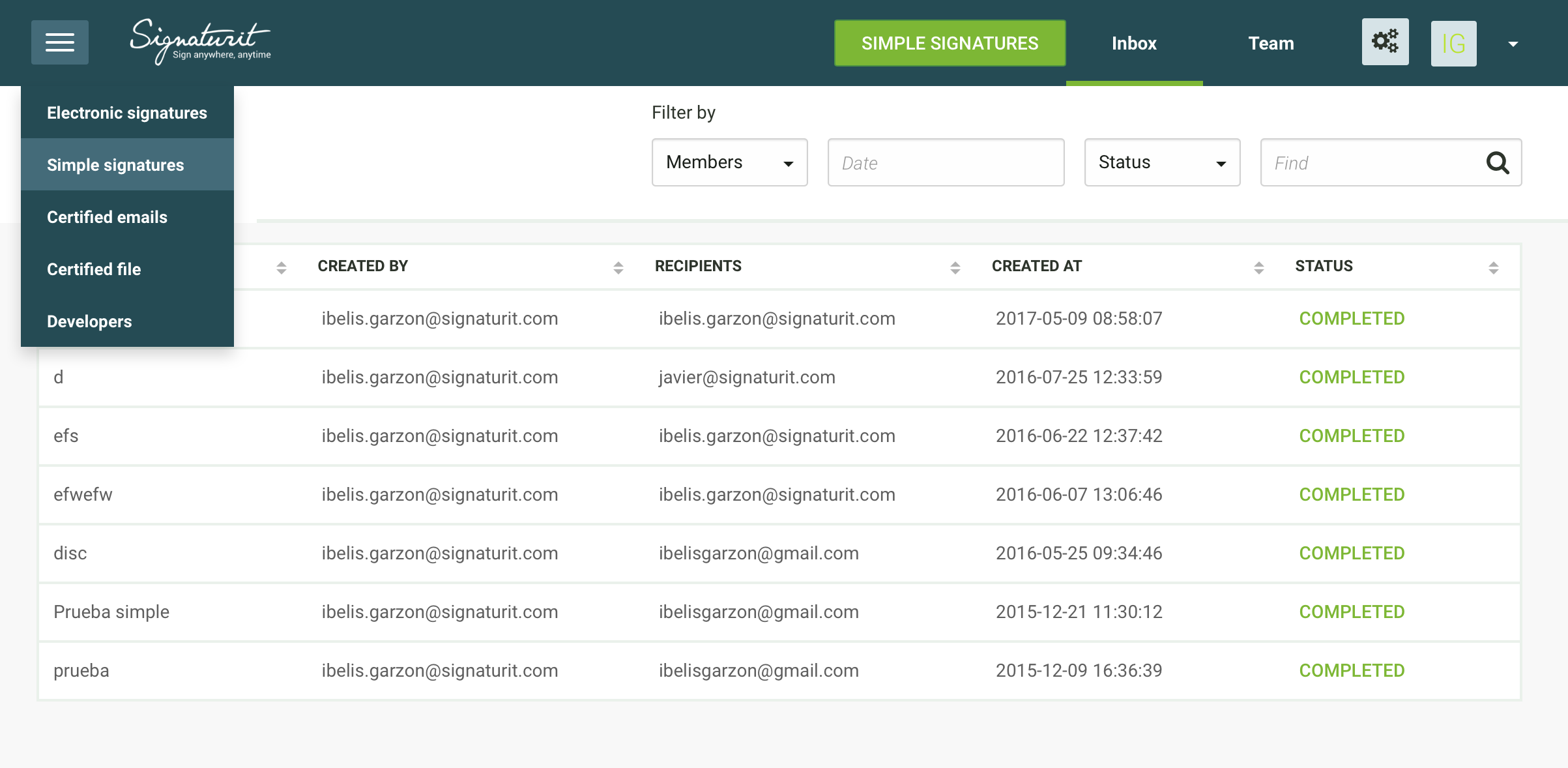Table of contents
If you’ve heard about electronic signatures, you’ve probably wondered what kind of documents can be signed with this technological solution. The answer is: any document, since the electronic signature is legal and its advantages – easy to use, security and speed – are suitable for all type of documents and contracts.
However, through our experience offering electronic signature solutions to thousands of customers, we have been able to identify which documents are most frequently signed with this tool.
In this post we talk about the 5 types of documents most signed by our clients with our advanced electronic signature solution since we started, and we will comment on what additional benefits they receive in each case.
The 5 most common uses of electronic signatures
1. Contracts, authorizations and client forms
Notably, our clients use the electronic signature for all those procedures that require their client’s signature:
- purchase / sale contract of products or services
- authorizations for providing a service
- technical service confirmation forms
- etc.
The reasons why our customers have decided to use our advanced electronic signature solution are diverse, but mostly they have to do with the need to offer their customers or consumers a simple user experience, which facilitates online purchases, but also face-to-face purchases that require signing paperwork.
The issue is to prevent customers from having to print a document, signing it, scanning it and sending it back signed to the company. Maybe it is not obvious but … who has printer and scanner at home today? Fewer and fewer people.

That is why our customers use our advanced eSignature tool, to offer a quick and easy shopping experience, which can be completed from home or from anywhere, through any device – smartphone, tablet, laptop or desktop – and without having to sign up for a service or to download any app.
Increasingly, customers are digitized, and no longer have the patience to complete long sales cycles or to follow analog signature processes. A tedious process alone can be reason enough to abandon a transaction, online or offline.
2. Labor contracts and other human resources operations
Human resources departments is another area where we detect a greater use of the electronic signature. In this case, speed is again the determining factor, but not the only one.
Companies use electronic signatures so that future employees can sign confidentiality agreements or contracts from home (or from wherever they happen to be), because this allows the company to transmit an innovative image.
Another relevant factor is that our solution allows to end with printing labor contracts. And along with that, the practice of requiring the employee to be present in the office to sign the employment contract in person, days before joining.

In addition, our electronic signature tool is very comfortable for the HR department, since it avoids having to print and save paper documentation, and allows to have all the documentation related to each recruitment centralized in the same platform. And don’t forget that by being in the cloud, the HR team can access it remotely.
With all these advantages, many companies that incorporate Signaturit as a tool in their HR departments do it via API integration. This means that Signaturit is integrated into the company’s HR software, and thus, signature requests can be made without having to access our platform.

3. Supplier contracts and agreements
The use of our advanced electronic signature is also common when dealing with supplier contracts. As in the previous cases, the image of an innovative company is projected, which also pays attention to its relationship with suppliers and looks for operational efficiencies to interact with them, to ease processing agreements.
In addition to operational and image issues, it is also decisive in this use case to have all the documentation related to supplier agreements centralized and accessible on the same platform.

For this reason, many of our clients that use Signaturit to send contracts to their suppliers also integrate our tool with their software via API. In the end, the easiest way is to integrate the whole process in a single software, and our solution is designed specifically for that.
4. Confidentiality or non-disclosure agreements
Non-Disclosure Agreements (NDAs) are the documents that govern the responsibility of confidentiality between two or more parties.
They are very critical documents for any company, because if there is fraud, it could mean the loss of intellectual property or involve the need to initiate litigation, either with a partner, supplier, customer or employee.
Due to this circumstance, our clients who have the need to sign NDAs use our advanced electronic signature solution without hesitation, because it allows us to uniquely identify the signer (as opposed to the simple signature). In addition, we also collect biometric data, which provides an additional layer of security in this regard.
On the other hand, since we use a time stamp authority, we guarantee the integrity of the signed documentation, which means that the contents / data of that documentation have not been altered after applying the time stamp.
For all this, and because we offer an evidentiary document (or audit trail) in which we also collect all the electronic evidence generated during the signing process, companies have the peace of mind that, in the event of a legal dispute, they have any legal evidence that they may need at their disposal, and they can bring it to court to win the case.
Related post: How are dubious signatures analyzed in a judicial process?
5. Public Petitions
Finally, we have detected a high use of the electronic signature to request the adhesion of the population in general, or certain particular groups, to requests of all kinds. These requests are usually addressed to public institutions, although there are also cases in which signatures are collected to demand or solicit something from private companies.
The main advantage of this use case, besides the speed, is that the signing process is very easy for the signers. If they are not really committed to the cause, they will not sign unless they can do it fast.
That is, the ease of the signature process is decisive in supporting a cause. If the signer has to go somewhere to sign in person, or if he/she has to print the document, sign it, scan it and send it back signed, he/she probably will not do that, even if it is a joint cause.
Conclusion
The applications and documents mentioned represent very clear use cases for which using the advanced electronic signature is a great advantage. And perhaps for that reason companies have detected these cases as the best “fit” to use this tool and simplify them.
However, as we discussed at the beginning of this post, the electronic signature can be used to sign all types of documents and contracts. In fact, there are many other categories of documents (and use cases) for which the electronic signature is particularly advantageous, such as licenses for the transfer of intellectual property, forms for identity or age verification, documents for acceptance of debt, etc.
Maybe your company has a use case that we have not mentioned? Now it is your opportunity to be a pioneer in a new application of the electronic signature. Click here to register and try Signaturit for free for 7 days.





